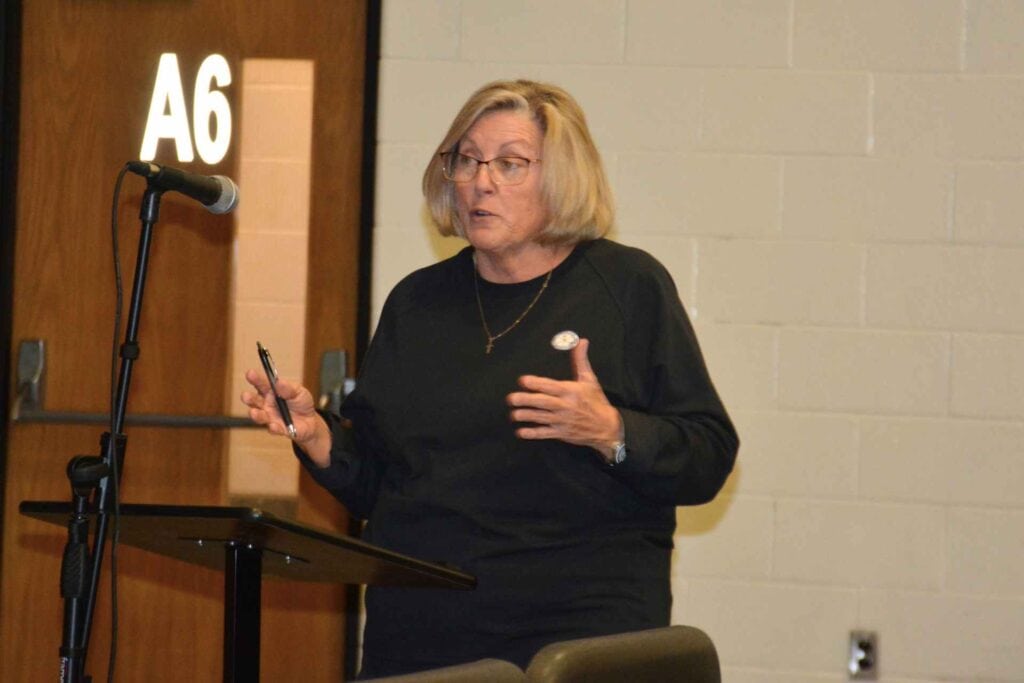TENNERTON – Upshur County Schools has failed to provide the required continuum of services to students enrolled in special education and students with disabilities or other exceptionalities. The district was also flagged for multiple related noncompliance violations, according to a recently released audit of the county’s Special Education Department conducted by the West Virginia Department of Education.
In the aftermath of the county takeover in June of 2023, Upshur County Schools Superintendent Christy Miller requested the West Virginia Department of Education conduct an audit of Special Education in the district. The county released that report Jan. 31, 2024, with names and identifiers redacted.
At Tuesday’s Upshur County Board of Education meeting, Miller provided a brief overview of the report’s findings.
“There were 11 areas of noncompliance – they are not easy areas to fix, but we are working on those,” Miller said.
Auditors from the Office of Special Education pinpointed the 11 areas of noncompliance after examining eight “Focus areas”: the Special Education Department itself, Discipline, Behavior, Instruction, Alternative Learning Center (the county’s Systems of Support program), Service Verifications, IEP File Review and Professional Learning.
Miller said the audit revealed Upshur County Schools has failed to supply what’s called a “continuum of services” in special education, which refers to multiple levels of assistance, services and accommodations school districts and local education agencies must make available to students with special needs, exceptionalities or disabilities.
“Another outcome of looking at this is looking at our continuum of services, which does not exist in Upshur County currently in Special Education,” Miller said. “We will be looking at resource rooms, and we will be looking at the establishment of self-contained classrooms to meet the needs of students – that’s what this is about.”
Countywide, all IEPs are now under evaluation, and Miller emphasized the importance of IEPs – an acronym for individualized education programs – being strictly student-centered.
“IEPs are not to be written to address adult needs; it is about the student’s needs, so we are looking very closely at those, and we will support the development of IEPs that are going to meet the needs of the student and why they were identified to be in specialized instruction to begin with.”
Earlier, during the public comment portion of the meeting, retired special education teacher Debbie Shapiro expressed her frustration to the board, Miller and Assistant Superintendent Russ Collett. Shapiro said she had been contacted by several parents of students with special needs who had not been receiving any educational instruction or services.

Shapiro said the child of one parent who contacted her hadn’t attended school in over 60 days because an administrator had informed the parent that the school system “could not find a special ed teacher and aide for the child.”
“You all know me — the hair stood up on the back of my head,” Shapiro said.
Shapiro said she organized a meeting with the parent and Miller.
“Sure enough, everything that the mother had been telling me was true,” she said. “Her child had not been educated for 61 days – no PT (physical therapy) services, no OT (occupational therapy) services, no speech services, no academic services.”
“Now, I don’t think that the downstairs part of the board office was even aware of this situation, which is a huge problem, so Mrs. Miller and I sat down and we brainstormed,” Shapiro said. “We figured it out, and we got that kid back in school.”
Shapiro also pleaded with Miller and Collett to stop the exodus of special education teachers – and general education teachers – from the county. According to the Feb. 27 personnel report, two special education teachers resigned effective June 30, and a third is retiring at the end of the school year.
“Mr. Collett and Mrs. Miller, please get a handle on what’s happening at the school-level administration in this county because it will never get better until you do,” Shapiro said. “I’m asking you guys to please hold people accountable because it’s criminal what’s happening to our special ed kids.”
During her superintendent’s report, Miller outlined some of the steps Upshur Schools is taking to make the mandatory improvements in the Special Education Audit. For instance, the county’s special education director, Ann Osburn, and two special education coordinators – as well as school counselors – have been trained to perform Functional Behavior Assessments.
Miller said she plans to complete that training.
“I have also asked that in Special Education, we develop a checklist – a very thorough checklist – for IEPs so that if they come in and they don’t meet those requirements on the list, then we need to send them back and we need to make it right,” the superintendent said.
In addition, administrators have completed training on Policy 2419, which delineates “Regulations for the Education of Students with Exceptionalities” and is based on the Individuals with Disabilities Education Act of 2004 and West Virginia Code Chapter 18, Article 20.
“I asked for there to be a special emphasis on discipline,” Miller said.
The Special Education Audit found “disproportionality in suspensions/expulsions for students with disabilities in most of Upshur County’s Schools.”
Miller said she hadn’t known that the student Shapiro referenced earlier hadn’t been receiving educational instruction or services.
“In her comments, Mrs. Shapiro mentioned the students that were out of the school environment,” Miller said. “No one knew they were out. That had not been shared with us. If had known that, we would have been able to address those needs immediately.”
The audit showed data regarding special education students who had been disciplined hadn’t been correctly entered into the West Virginia Education Information System.
“What we did find out when the state was here was that students who are being disciplined that are in special education, those days are not being entered correctly in WVEIS, which is the way that we pull all of that data, so that’s something we’re going back and correcting as well,” Miller said.
The superintendent said assistant principals often lead meetings concerning IEPs and 504 plans – plans for students with disabilities who don’t need special education services – so they will also receive training on Policy 2419.
“Then, we can really start working on, ‘What does this look like for our Continuum of Services?’ and where do we need to make considerations for those?” Miller said.
Board president Dr. Tammy Samples asked if the WVDE’s Office of Special Education had issued a deadline by which the school system had to rectify the areas of noncompliance.
“Is there a timeline to have those issues corrected?” Samples asked.
“Currently, we have a timeline of March 24, but the State Department knows that we are not going to meet those timelines for all of those areas because we still have to have specially designed instruction that has to be provided by them, and they don’t have someone to come and do it yet,” she replied.
In addition, Miller said the school district must provide positive behavior support training as well as several other trainings.
“We will complete all IEP reviews by March 26, not March 24, but most of the deadlines are March 24,” Miller said.













